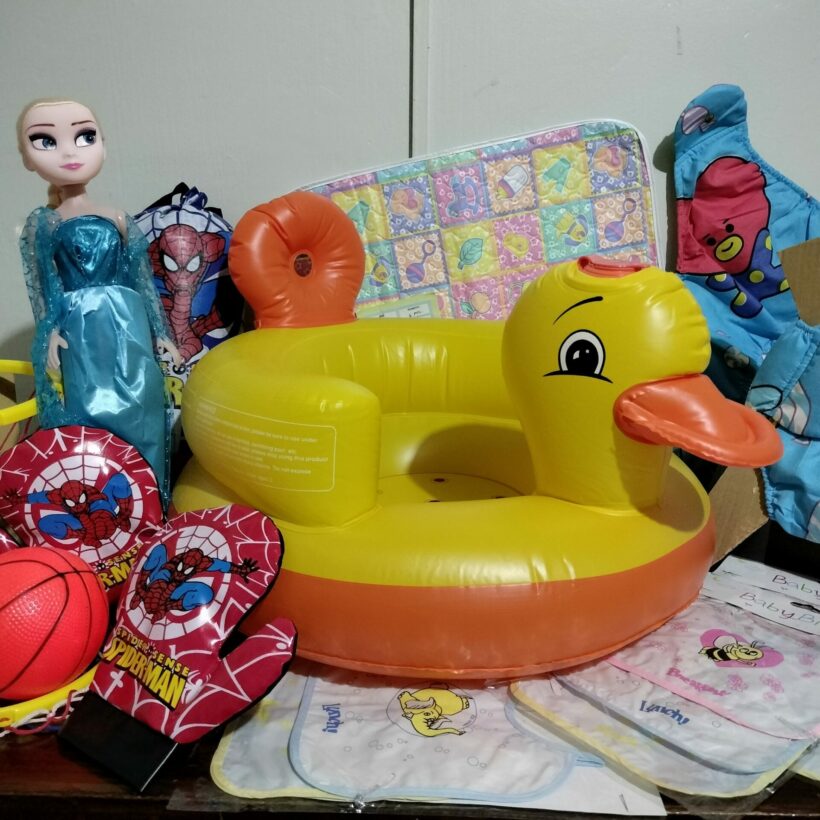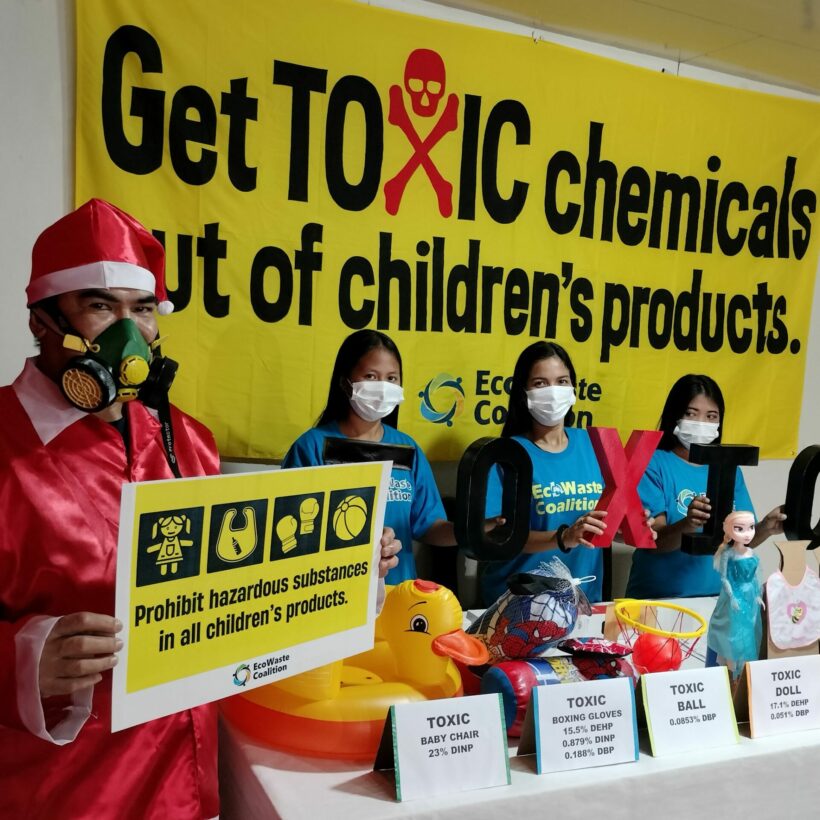22 November 2022, Quezon City. Amid the observance of National Children’s Month and the Christmas shopping season, the toxics watchdog group EcoWaste Coalition has sounded the alarm over the presence of known endocrine-disrupting chemicals (EDCs) called phthalates (pronounced THAL-ates) not only in toys but also in baby care products.
The warning came on the heels of the group’s detection of phthalates in toys and baby care products that it bought from retailers and submitted to a private laboratory for analysis.
“Our investigation shows that phthalates in toys and child care articles, including products typically used by babies, remain to be a threat to human health despite existing restrictions on their uses,” said Aileen Lucero, National Coordinator, EcoWaste Coalition. “Strengthened and expanded regulations, including chemical ingredient transparency, are needed to protect fetuses and children from phthalates and other EDCs in products and the environment.”
“The endocrine system plays a critical role in regulating every aspect of human growth, development and overall health. Exposure to phthalates and other EDCs even in tiny amounts can disrupt the essential functions of the endocrine system and lead to hormonal imbalances, which may result in reduced intellectual capacity, reproductive disorders, weakened immune system, and other behavioral and health issues,” said Dr. Geminn Louis Apostol, environmental health specialist, Ateneo School of Medicine and Public Health.
Phthalates are synthetic chemicals, often called plasticizers, used to make plastic such as polyvinyl chloride (PVC) pliable and soft. Found in a wide range of consumer and household products, phthalates are able to leach out from the materials containing them and get ingested, inhaled, or absorbed by the skin.
Studies in animals and humans have linked phthalate exposure to a wide range of health problems, including asthma and allergic illnesses, cardiovascular diseases, cancers, neurodevelopmental disorders such as attention deficits, learning difficulties and intellectual disability, and reproductive health disorders such as genital abnormalities and undescended testicles for baby boys, reduced sperm counts and testosterone levels in adult males.
In 2011, the Department of Health (DOH) issued Administrative Order No. 2009-0005-A making it “unlawful for any person to manufacture for sale, offer for sale, distribute in commerce, or import into the country any children’s toy that contains concentrations of more than 0.1 percent of di-(2-ethylhexyl) phthalate, dibutyl phthalate (DBP) or benzyl butyl phthalate (BBP).”
Diisononyl phthalate (DINP), diisodecyl phthalate (DIDP) and di-n-octyl phthalate (DnOP) in concentrations exceeding 0.1 percent in toys that can be placed in a child’s mouth are further banned by the said regulation.
Of the seven products sent by the EcoWaste Coalition to SGS (a global testing company) for phthalate analysis, five products had DEHP ranging from 0.325 to 17.1 percent, three had DINP ranging from 0.879 percent to 23 percent, and three had DBP ranging from 0.051 percent to 0.188 percent. The items were analyzed using gas chromatography-mass spectrometry (GC-MS).

Specifically, the plastic head of a doll tested with 17.1 percent DEHP and 0.051 percent DBP; a pair of toy boxing gloves had 15.5 percent DEHP, 0.879 percent DINP and 0.188 percent DBP; and a mini soft basketball had 0.0853 percent DBP.
As for the baby care products, the plastic lining of a reusable panty for babies was found to contain 14.3 percent DEHP; a baby diaper changing mat had 8.62 percent DINP and 0.325 percent DEHP; a baby bib had 8.67 percent DEHP; and a baby inflatable chair tested with 23 percent DINP.
To prevent children’s exposure to phthalates in toy and baby care products, the EcoWaste Coalition advises consumers to:
— Steer clear of products made of PVC, vinyl or plastic marked #3.
— Refrain from buying soft and squeaky plastic toys unless certified phthalate-free.
— Avoid plastic products with a strong chemical smell.
— Purchase duly authorized and labeled products from licensed distributors, wholesalers and retailers.
— Look for reliable phthalate-free marks on the product label.
“In this season of shopping and giving, we renew our call on manufacturers to make and offer for sale toy and child care articles that are duly labeled and safe from phthalates, heavy metals, flame retardant and other hazardous substances,” the EcoWaste Coalition said.
Reference:
https://www.fda.gov.ph/wp-content/uploads/2021/05/Administrative-Order-No.-2009-0005-A.pdf










